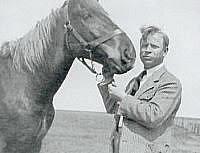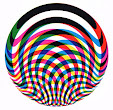Saturday, February 9, 2008
New review of Jahnn's The Ship
Nathaniel pulls out some quotes from the book:
"And he discovered that he was inferior to these men. They had had experience in every direction. At fourteen they had already mistaken the joys of Hell for the bliss of Paradise, and, later, stood again and again with empty hands in a completely illuminated world . . . Gustave envied them, not for their miserable experiences, but for the particular smell of reality which would never be his because he didn’t have the courage, wasn’t sufficiently carefree, to let himself be torn to shreds for no good reason."
"He, Gustave, had seen him hanging in the thorny thicket of overpowering hellish hatred, at the mercy of a horrible heightening of his desires, a supernatural instrument of accumulated sterility, bursting upon all growing things like a shower of hail."
"The futile expectations of a condemned creature are without parallel; the hope of being allowed to cross the saving threshold of a miracle is the bedfellow of the fear of death."
Sunday, February 3, 2008
Kebad Kenya, "The living are few, the dead many."

My friend Anthony tried to explain the image to me: "The letters represent notes with middle C obviously being in the center. Yellow lines are octaves, red lines are thirds, and blue lines are fifths. Where these lines intersect the grid is a note of relative distance to C. This is a spatial representation of the ratios that determine pitch in the western tonal scale." And when I still didn't quite grasp it he helpfully added: "You know how the frets higher up on the guitar are closer together, less distance between tones? As the pitch goes higher and higher and approaches infinity the space between these frets would get proportionately smaller as they approach zero (that is represented at the top of the pyramid in this diagram). Well there is a ratio that determines how this distance affects pitch and I believe that this diagram represents these ratios geometrically for certain modal scales that deal in octaves, fifths and thirds."
Hans Henny Jahnn
 When asked by PEN America "What great books have never been translated into English?" Tim Crouse (journalist and author of Boys on the Bus) responded:
When asked by PEN America "What great books have never been translated into English?" Tim Crouse (journalist and author of Boys on the Bus) responded:
"Two great peaks, one of fiction, the other of poetry, are still invisible to the English-speaking world, but it seems to me that once translations scatter the mist, the literary landscape will never look the same. (1) The novels of Hans Henny Jahnn (German, 1894-1959). So far as I know, only the first volume of his great "Fluss Ohne Ufer" trilogy has found its way into English: Das Holzschiff (The Ship, trans. Catherine Hutter, Scribners, 1961). That leaves the other two volumes still to go, plus Perrudja, Ugrino und Ingrabanien, and 13 Nicht Geheren Geschichten (Thirteen Unreassuring Stories)--all treasures. [Ed note: The last title mentioned by Crouse was indeed translated into English as Thirteen Uncanny Stories, though it seems to be out of print at the moment; see the rest of this post.] I know them from the French versions. (2) The poems of David Rosenmann-Taub (Chilean, b. 1927). Cortejo y Epinicio (Cortege and Epinicion), Los despojos del sol (The Spoils of the Sun), and El cielo en la fuente (The Sky in the Fountain) are among the most original, profound, and wrenching books of poetry I've read."
I have never encountered Rosenmann-Taub, but Hans Henny Jahnn is one of my favorite authors. This is my second post dedicated to him. Read the first here. To read the rest of PEN America's list, go here.
From Gerda Jordan's introduction to her translation of Thirteen Uncanny Stories by Hans Henny Jahnn (published by Peter Lang):
"'He was a writer of Baroque sexuality, of fleshiness and macabre desperation [...]. The reader continuously stumbles over coffins and tombs, witnesses deeds of horror, awesome fear of death and the performance of the necessities of metabolism....'
"Thus wrote Werner Helwig to his close friend Hans Henny Jahnn. It was not Helwig's own criticism of Jahnn, but that of a critic he had invented in order to show Jahnn what the public thought of his work. No invented critic was needed, however; Jahnn is known as 'the writer who uncovered the hells of the flesh and drives, the abyss of demoniacal passions and sinister licentiousness,' his writings are described as 'materialism of pure faith in the body,' his reader is 'numbed by the eternal drone of the hormone organ.' Polite euphemism calls him the 'uncomfortable' writer.
"The object of this and similar criticism, Hans Henny Jahnn, novelist and dramatist, misunderstood in his life time and since his death, is little known in his own country, not to mention the outside world..."
***













